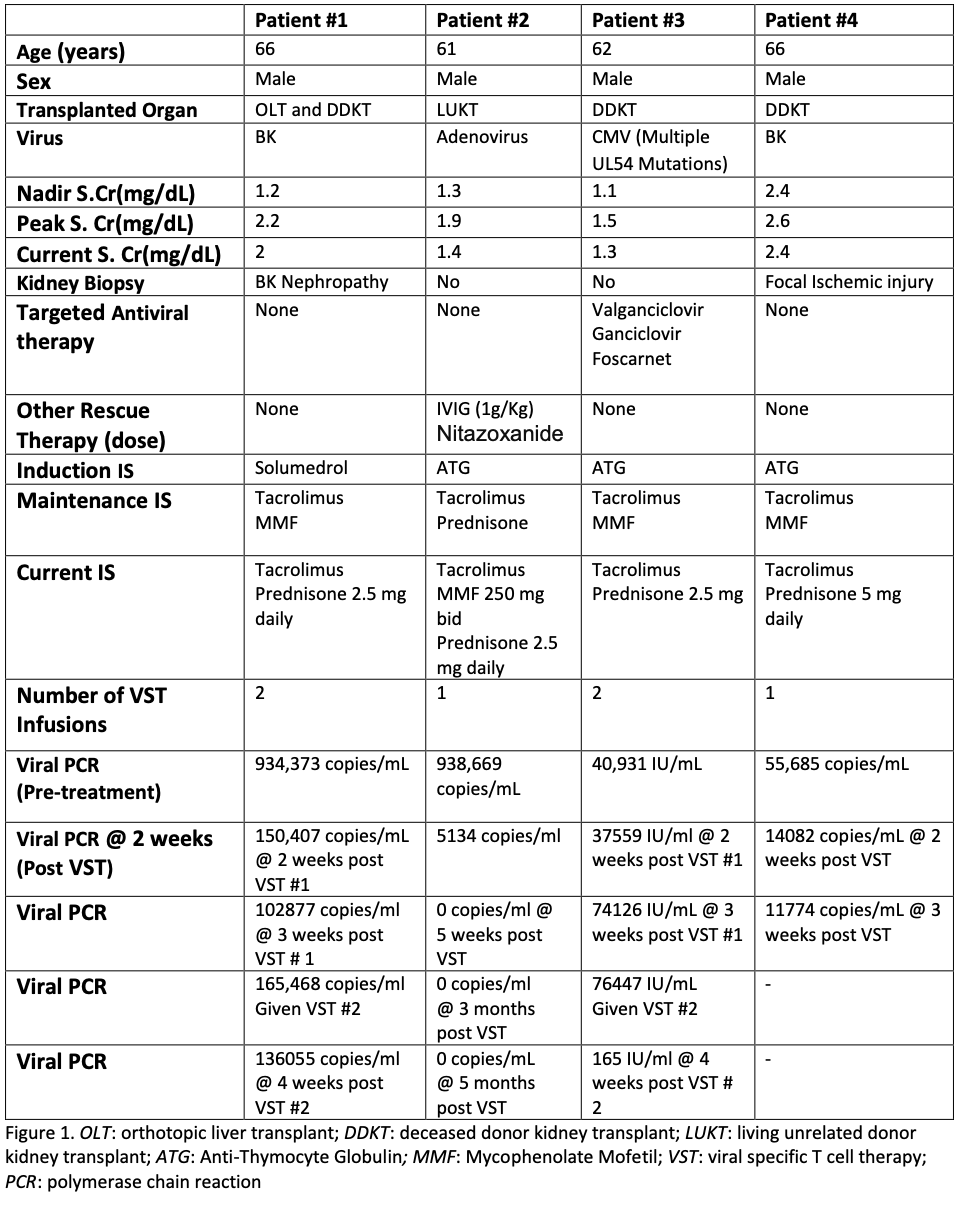Use of Viral Specific T Cell Therapy in Solid Organ Transplant Recipients – A Single Center Experience
G. McGraw1, N. Patel2, K. Patel1, S. Bumb3, A. Govil4, M. Anand1
1University of Cincinnati, Cincinnati, OH, 2Nephrology, University of Cincinnati, Cincinnati, OH, 3Nephrology, Internal Medicine, University of Cincinnati Medical Center, Blue Ash, OH, 4Univ of Cincinnati, Cincinnati, OH
Meeting: 2022 American Transplant Congress
Abstract number: 1637
Keywords: Adenoviruses, Cytomeglovirus, Polyma virus, Viral therapy
Topic: Clinical Science » Infection Disease » 24 - All Infections (Excluding Kidney & Viral Hepatitis)
Session Information
Session Name: All Infections (Excluding Kidney & Viral Hepatitis) IV
Session Type: Poster Abstract
Date: Tuesday, June 7, 2022
Session Time: 7:00pm-8:00pm
 Presentation Time: 7:00pm-8:00pm
Presentation Time: 7:00pm-8:00pm
Location: Hynes Halls C & D
*Purpose: Viral infections such as BK virus (BKV), cytomegalovirus (CMV) and adenovirus after kidney transplantation negatively impact outcomes in solid organ transplant (SOT) recipients despite advancements in screening and prophylactic therapy. There is emerging evidence in hematopoietic stem cell transplant recipients that viral specific T cells serves as a prognostic indicator for identifying patients at risk for viral complications. We describe initial experience of using the viral specific T (VST) cell therapy in solid organ transplant recipients at our transplant center.
*Methods: Four SOT patients with Adenovirus, BKV and CMV infections were given viral specific T cell therapy through a tertiary care center which is the only center in the country able to provide third-party VST cell therapy approved by the research protocol. Key exclusion criteria were use of anti thymocyte globulin within 2 weeks of VST infusion, use of steroids >0.5g/Kg/day and uncontrolled bacterial or fungal infections.
*Results: Figure 1 depicts the clinical and laboratory data for each of these patients. All the patients tolerated VST infusion without any complications such as graft versus host disease or cytokine release syndrome over short follow up period.
*Conclusions: Reduction in immunosuppression and use of antiviral therapy form the current treatment paradigm for adenovirus and CMV infections in SOT recipients. There is no effective antiviral therapy available for BKV. Patients that are resistant to antivirals, and those that have increasing viral titers despite conventional management indicate a poor T cell immunity, with or without allograft dysfunction and may benefit from VST cell therapy thus prolonging allograft survival. Our case series suggests a promising role for VST however there is need for more studies to understand the efficacy, short and long terms risks associated with T cell therapy.
To cite this abstract in AMA style:
McGraw G, Patel N, Patel K, Bumb S, Govil A, Anand M. Use of Viral Specific T Cell Therapy in Solid Organ Transplant Recipients – A Single Center Experience [abstract]. Am J Transplant. 2022; 22 (suppl 3). https://atcmeetingabstracts.com/abstract/use-of-viral-specific-t-cell-therapy-in-solid-organ-transplant-recipients-a-single-center-experience/. Accessed February 20, 2026.« Back to 2022 American Transplant Congress

